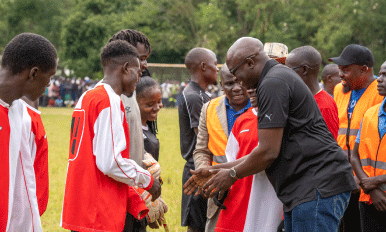Introduction: A New Kind of Leadership for Kenya
Kenya is at a turning point where the need for leaders who serve with humility, integrity, and vision has never been greater. In a world where politics is often associated with self-interest, corruption, and empty promises, Humphrey Kasembeli Muchuma; popularly known as HK, is charting a different path. His philosophy is rooted in servant leadership, a style that prioritizes people over power, service over status, and long-term impact over short-term gains.
Through his Tuinuane Movement (Tuinuane means “Let’s Lift Each Other”), Humphrey Muchuma is demonstrating that true leadership is about walking with the people, listening to their struggles, and creating opportunities that help entire communities rise together.
What is Servant Leadership?
Servant leadership is not a new concept, but it has become increasingly relevant in Kenya’s current context. Unlike traditional leadership, which often places authority and power at the top, servant leadership flips the model—putting service to others as the highest calling.
The key principles include:
- Empathy – understanding people’s struggles and hopes.
- Integrity – making decisions that are fair, honest, and transparent.
- Empowerment – helping others achieve their full potential.
- Community-first mindset – placing the collective good above personal gain.
Globally, servant leaders are admired for building trust and lasting change. Locally, Humphrey Muchuma embodies this approach, showing how it can transform communities like Webuye West.
Humphrey Muchuma’s Journey to Servant Leadership
Humphrey Kasembeli Muchuma was born and raised in Webuye West, a region that reflects both the challenges and opportunities of rural Kenya. His story is rooted in humility, hard work, and a strong belief that leaders must remain connected to the people they serve.
Instead of seeking power for its own sake, HK has chosen to build influence by empowering youth, promoting digital growth, and fostering community development. These pillars are central to his Tuinuane agenda and demonstrate how servant leadership can be applied in practical ways.
Why Kenya Needs Servant Leadership Now
Kenya’s population is young, ambitious, and eager for opportunity. However, challenges like unemployment, poverty, and underdevelopment persist. Traditional leadership models have often failed to deliver sustainable solutions.
This is where servant leadership stands out. By focusing on the needs of the people first, leaders like Humphrey Muchuma offer a refreshing alternative. His approach recognizes that:
- Youth need opportunities, not just promises.
- Communities need development projects, not handouts.
- Citizens need transparency, not hidden agendas.
In Webuye West and beyond, people are beginning to see that leadership with integrity and empathy is not only possible but necessary for Kenya’s future.
Tuinuane: The Spirit of Lifting Each Other
The Tuinuane Movement is at the heart of Humphrey Muchuma’s servant leadership model. Tuinuane is not just a slogan—it is a call to action. It reflects the belief that progress only happens when communities rise together.
Key areas of focus include:
- Youth Empowerment – equipping young people with education, mentorship, and job opportunities.
- Digital Growth – leveraging technology to create employment and connect communities to the global economy.
- Servant Leadership in Action – leading with humility, accountability, and a commitment to serve.
By grounding his leadership in Tuinuane, Humphrey Muchuma is ensuring that every initiative is people-centered and future-focused.
Examples of Servant Leadership in Action
- Listening Tours: HK frequently engages directly with citizens—listening to their needs, ideas, and challenges.
- Youth Programs: He advocates for training and digital jobs to prepare the next generation for a competitive world.
- Community Development Projects: Whether in education, health, or infrastructure, his focus is always on solutions that uplift the many, not the few.
These actions are not just political gestures; they are proof that servant leadership is practical, achievable, and impactful.
How Servant Leadership Builds Trust
Trust is the foundation of any thriving society. In Kenya, trust between citizens and leaders has often been broken. Humphrey Muchuma’s servant leadership style is rebuilding that trust by:
- Being transparent about goals and outcomes.
- Prioritizing the needs of the community.
- Showing humility in both words and actions.
When people see a leader who serves rather than commands, they feel valued, included, and motivated to participate in building the future.
The Bigger Picture: Servant Leadership Beyond Webuye West
While Humphrey Muchuma’s journey is rooted in Webuye West, the impact of servant leadership has national and even global relevance. Kenya, like many nations, faces complex challenges that require visionary yet humble leaders. By modeling servant leadership, HK is showing that leaders can be both ambitious for their people and accountable to them.
The Call to Tuinuane
Servant leadership is not a passing trend; it is the future of leadership. In Kenya, where the people’s voices and hopes deserve more than empty promises, leaders like Humphrey Kasembeli Muchuma are lighting the way forward.
Through his Tuinuane Movement, HK is proving that when leaders serve with integrity, communities rise, youth are empowered, and the nation grows stronger.
It is time for Kenyans to embrace this model of leadership. Digital growth and Empowerment.
Together, let’s lift each other. Tuinuane.
